BERKEY WATER FILTER REVIEW
I saw my first Berkey water filter many years ago as a kid at a friend’s house. It wasn’t until my adult years that I learned why water filters are so important. I’m sharing all about our Berkey, it’s pros and cons, and a few helpful tips.
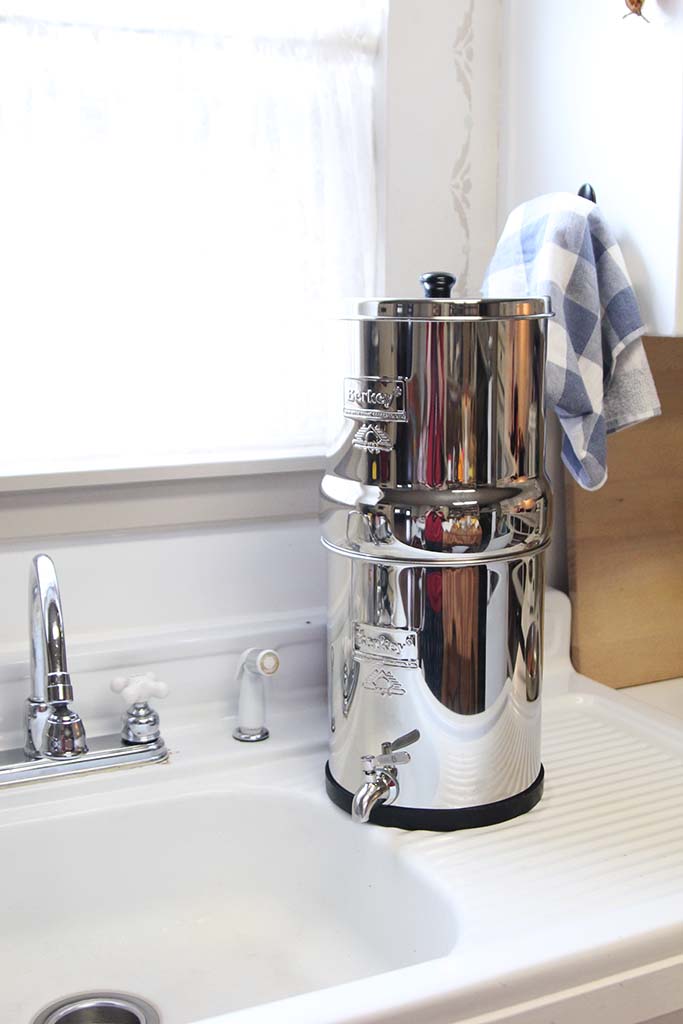
This is not a sponsored post and all opinions are 100% my own true feelings. This post contains affiliate links which means that I make a small commission at absolutely no extra cost to you. Read my full, boring disclosure here.
Why Is Water So Important Anyway?
For starters, up to 60% of the adult human body is water! Water is vital to the function of our bodies and works in various ways such as lubricating joints, acting as a shock absorber for the brain, spinal cord, and fetus, and regulating body temperature. {Source}
Personally, I can tell when I’m not drinking enough because I start getting headaches. I go drink a huge glass of water and within 30 minutes my headache starts to fade.
Let’s Talk Water And Health
I try to make healthy choices and support my body {and my family} through the foods I eat and the products I put in and on my body. I don’t buy in to the “you’ve got to die from something” way of thinking. I want to be as healthy as possible so I can be here for my family and enjoy my life for the short amount of time that I get to be here.
That means I’m very careful to avoid as many harmful chemicals and the garbage that is added to basically every conventional thing we buy these days. From boxed foods all the way to skin care, it’s loaded with things that have no business in or on the human body. There are so many things that are out of my control, mostly environmental, but there are just as many things that I can do to reduce toxins and do my best to keep my family healthy.
It’s kind of a soap box for me. I really do believe the top reason so many people are unhealthy is due to all of that garbage that’s coming in through almost every aspect of our daily lives. Even when we’re trying to do something healthy like drink more water, if it’s full of chlorine, fluoride, nitrites, and other contaminants it kind of defeats the purpose!
So hopefully we can all agree that reducing toxins in our lives is a good thing. Why would you want your water to be any different? Since our bodies are made up of approximately 60% water, drinking more and staying well hydrated is a big part of staying healthy. But not if it’s full of things like hormone disrupters {fluoride} and chemicals known to be toxic to humans {chlorine} among other things.
Side note: Fluoride was one of the first things I made a big effort to eliminate since two people in our family already have endocrine disorders, which are hormone related. If I were on a city water supply this would be HUGE for me.
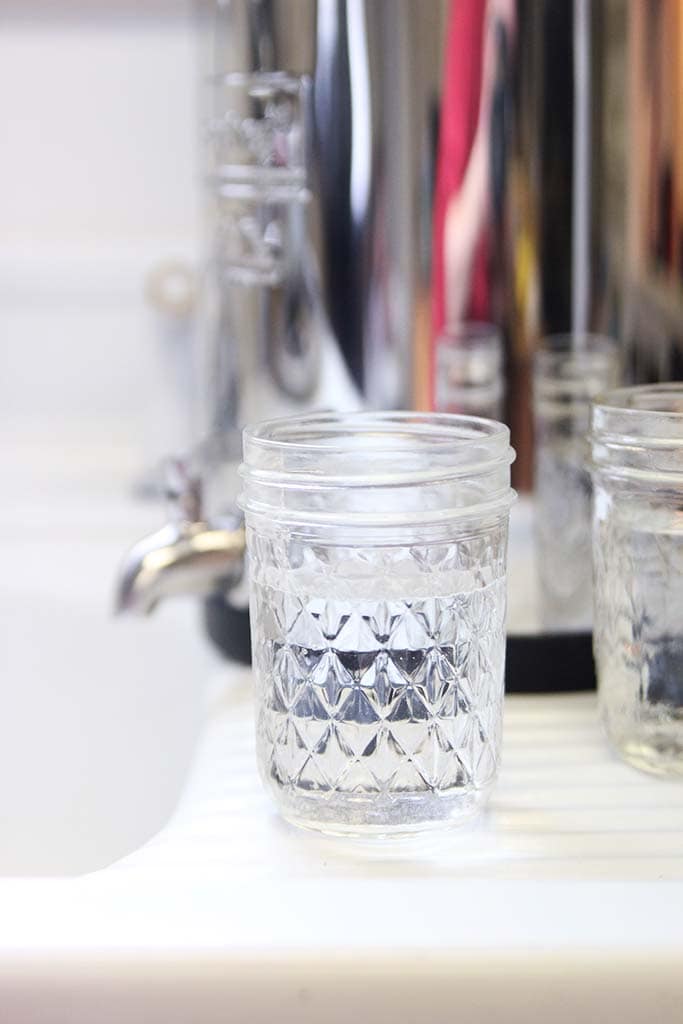
So What’s In Water?
Common drinking water contaminants vary depending on where you live and what kind of water you’re drinking. These include naturally occurring chemicals and minerals such as arsenic, radon, and uranium.
Water can be contaminated by things like byproducts of manufacturing processes, malfunctioning waste water treatment systems, and fertilizers and pesticides if you’re in a concentrated farming area. Common city water supply contaminants include chlorine from the cleaning process and fluoride that has been added.
Unfortunately even well water isn’t guaranteed to be free from nasty stuff. The CDC recommends to test yearly {depending on where you live, well type, well location, etc.} for total coliform bacteria, nitrates, VOCs, lead, arsenic, mercury, radium, atrazine, and other pesticides. {Source}
What’s A {Health Conscience} Person To Do?
If you want to improve your health and well being by drinking more water and making sure that it’s clean, healthy water, you’ll need to either buy water {if you can find a trustworthy source} or buy a filter to clean the water that you already have.
Considering the cost and impact of purchasing all of your water bottled, a filter seems like the obvious choice to me. Water bottles add up big time in both expense and the amount of garbage and waste that they cause.
There are many different kinds of filters for home use: reverse osmosis, ultraviolet, water filter pitchers, faucet filters, whole house filters, gravity filters, and many more. So how do you choose? A lot of it has to do with what you’re wanting to filter out and a big part of it for many people, including me, is budget. Some of these things can have really hefty price tags and still not be the perfect water filtering solution.
A Berkey is the filter that we decided on. Keep reading to find out what it is and why we love it.
What Contaminants Does A Berkey Water Filter Remove?
The Berkey filter is actually considered a water purifier because it removes 99.999% of viruses and 99.9999999% of pathogenic bacteria which exceeds the requirement of 99.99% and 99.9999%, respectively. Instead of using chemicals like iodine and chlorine to meet the purification standards, Berkey filters use micro-filtration and ionic absorption.
But how does it work?
“The element’s filtration media is a combination of micro-pores, which trap harmful contaminants like bacteria, and revolutionary material with adsorption and ion exchange properties that essentially attract molecules and viruses to the media, preventing them from passing into your drinking water.”
Berkey Website
I’m not much of a science person, but that’s still pretty cool!
So what does it actually remove?
Berkey filters remove:
If you want to learn more about the specs and every single thing the Berkey filters have been tested for, click over to their filter specifications page here. It’s really quite overwhelming to be honest.
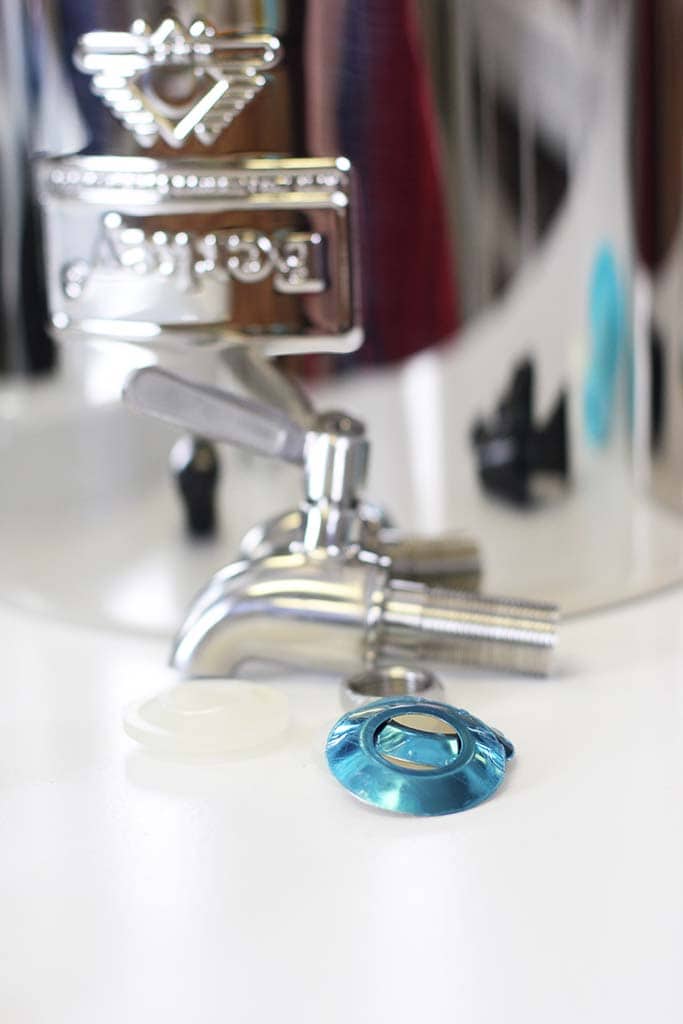
Pros And Cons Of A Berkey Water Filter
With using the Berkey water filter, plus the research I’ve done on them and other filters, I’ve come up with what I consider to be some thoughtful pros and cons of the Berkey water filter. There are some things I’m leaving off the list such as regular maintenance like cleaning the unit or changing filters. Those tasks have to be done no matter which filter you choose.
Pros: Stainless steel construction
Pros: You can clean and test the filters
Pros: Berkey filters out so much more than popular home filters
Pros: Portable
Pros: Reduces waste
Pros: Removes fluoride and arsenic (with added filters)
Pros: Beneficial minerals aren’t removed
Pros: Can filter any water source
Pros: Filters have a very long life
Cons: High Up-front cost
Cons: Takes up valuable counter space
Cons: Must be re-filled regularly
Stainless Steel Construction
Stainless steel is extremely durable and won’t corrode or rust. If taken care of it will quite literally last forever! It’s also very low maintenance and easy to clean. They also have a stainless steel spigot that you can replace the cheaper plastic one with.
Tip: If you have hard water that leaves mineral deposits in your stainless steel Berkey filter body, use vinegar to break the deposits down and get it clean.
You Can Clean And Test The Filters
One thing I really appreciate about the black Berkey filter elements is that you can clean them periodically if the flow starts getting really slow. Just be sure to re-prime them after you’re finished. You can also do a red food dye test to see if the filters are still keeping the bad stuff from going through. If they’re still filtering good then the water will come out clear. If it comes out red, it’s time for new filters.
Berkey Filters Out So Much More
As I mentioned above, the Berkey takes out so much of the nasty stuff that can contaminate our regular tap water. Check out that huge long list that I linked to {here} and compare that to the Brita pitcher filter that I looked at that reduces chlorine, cadmium, mercury, copper, and zinc. That’s a really big difference!
There will probably never be a perfect water filtering system, but the Berkey filters out so much more than any other filter I’ve seen.
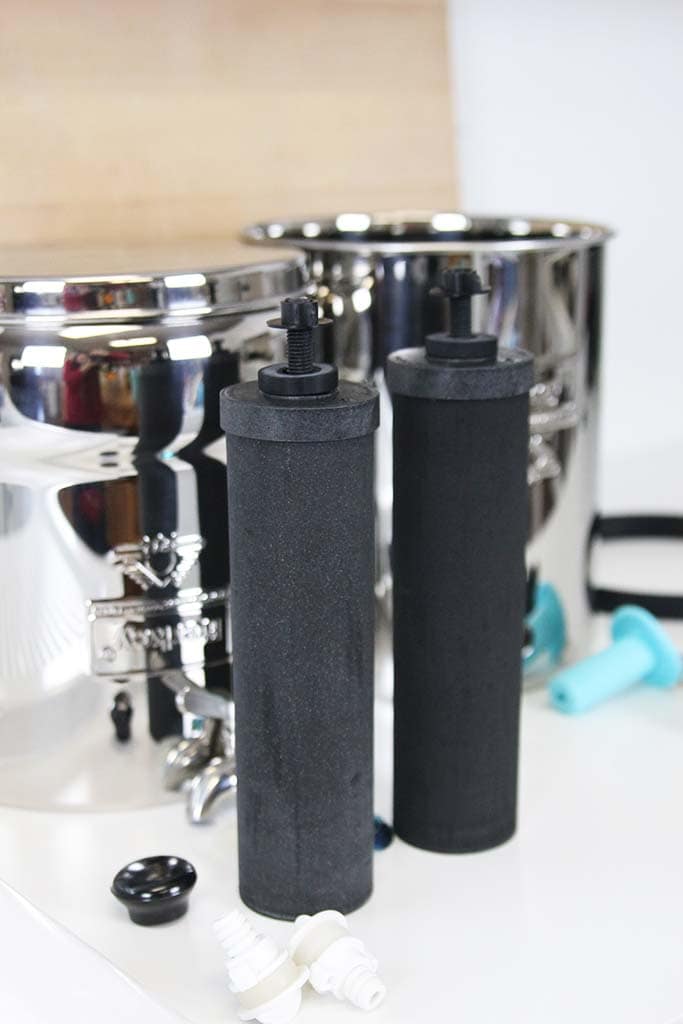
Portable
The Berkey filter is a countertop unit which means that it can be moved around to different places if needed. You can also empty it out, remove the filters, and take it with you on vacation or a camping trip. Just be sure to handle the filters carefully. You’ll probably want to wrap them in towels before transporting to reduce the chance of them getting cracked.
Reduces Waste
I’ve never thought of our family as wasteful or creating a lot of garbage, but it’s eye opening when the garbage truck doesn’t come for a week or two just how much trash our lifestyles create. From food packaging to cardboard boxes, it adds up quickly. With a household filter, you can eliminate the need for plastic bottled water waste, at your house at least. We each have our favorite cup or bottle that we keep filled through the day.
Removes Fluoride and Arsenic
With the addition of the white fluoride filters, the Berkey removes arsenic and fluoride which most filters don’t. The fluoride filters are an add on that screw directly onto the black Berkey filters and hang in the bottom compartment.. It’s recommended to change the fluoride filters every 1,000 gallons as opposed to every 6,000 gallons for the black filter elements. Although they have to be changed more frequently than the black filters, they’re less expensive and it’s worth it to know you’re getting those added things out of your water.
Beneficial Minerals Aren’t Removed
The problem with filters like reverse osmosis systems and distillation is that all of the beneficial minerals are removed along with the harmful contaminants. This can have very negative health impacts long term and demineralized water isn’t recommended for long-term consumption. {Source}
According to their website, “Berkey purification systems do not remove the beneficial minerals from the water, but they do extract harmful heavy metals such as lead and mercury as well as sedimentary minerals such as iron oxide. Therefore, the TDS (total dissolved solids) reading will not typically change much unless there are a lot of heavy metals or sedimentary minerals in the source water.”
Can Filter Any Water Source
While it would definitely reduce the life of the filters, a Berkey can filter any water source including ponds and streams. That ability makes them perfect for an emergency situation or natural disasters when electricity wouldn’t be available.
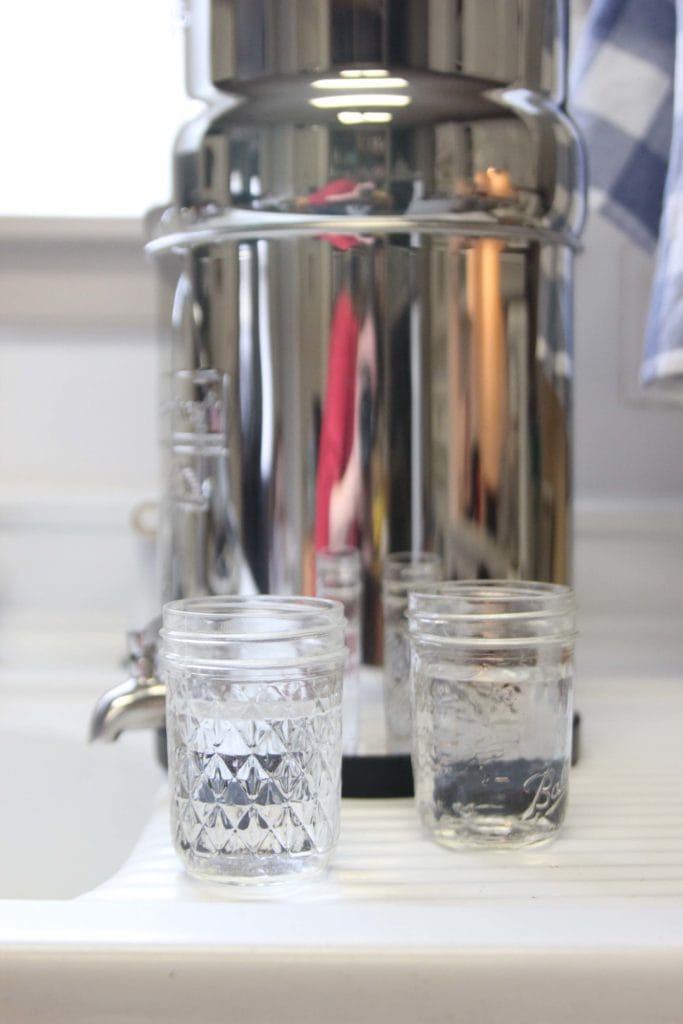
The Filters Last A Really Long Time
The black filter elements are rated to last 6,000 gallons per every 2 filters. So if you have 2 filters on your Big Berkey you’ll be able to filter 6,000 gallons of water before needing to change them. That’s a lot of water! Like I mentioned above, the fluoride filters need to be changed every 1,000 gallons but that’s still a long time to last before needing replacement filters.
That takes your cost per gallon to less than two cents for clean water!
>>> HOW TO PRIME BERKEY FILTERS | Black Filters and Fluoride Filters <<<
Cons Of A Berkey Water Filter:
High Upfront Cost
Compared to a pitcher filter like a Brita that you can get for as cheap as $15, a Berkey is quite an investment. But that’s exactly what it is: an investment for your health.
And when you look at it over a period of time, the Berkey actually comes out way ahead on cost savings because of how long the filters last compared to how often you have to change filters in the pitcher systems.
Takes Up Counter Or Pantry Space
Because it is a countertop gravity water filter system, the Berkey does take up valuable countertop space. It’s too tall to sit under the standard top cabinets so many times it requires a bit of creativity to find a good home for it.
Many people like having it next to the sink for easy filling. Because of the way the spout is, you’ll either have to situate it hanging off the edge of the kitchen counter or get a stand to elevate it which can make it more challenging to fill.
Has To Be Refilled Regularly
No matter which model you choose, your Berkey will have to be refilled on a regular basis. It can seem like a hassle even though it doesn’t take long at all, even filling it with a pitcher.
I almost think this isn’t even worth mentioning since all water filtering systems will need to be refilled unless you have an in line type system.
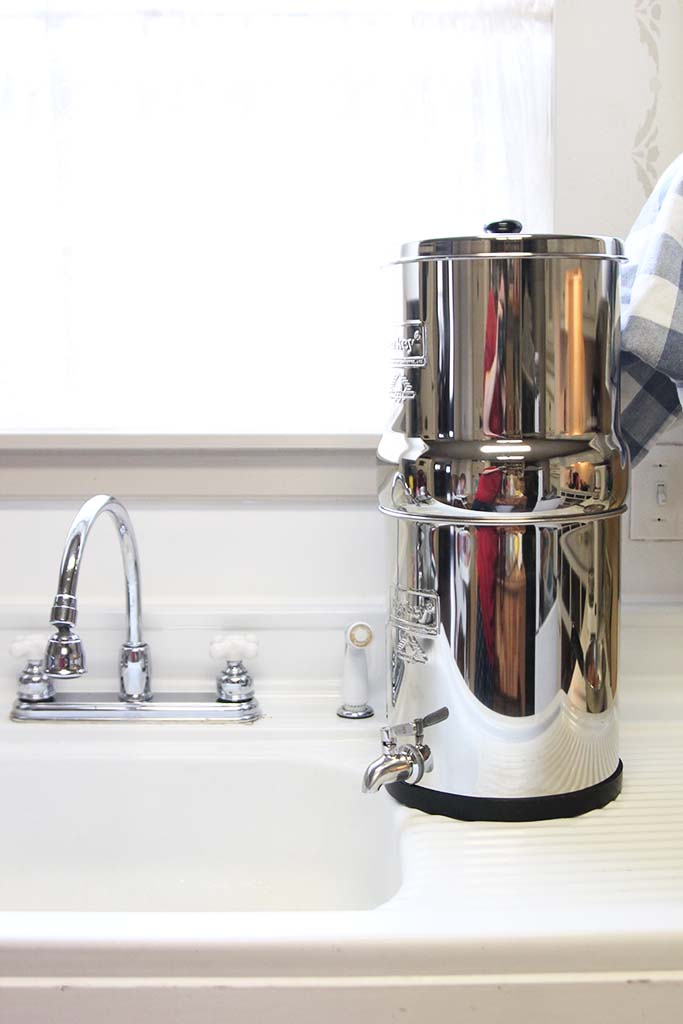
Weigh Your Needs
Personally, I think the Berkey system pros far outweigh the cons but ultimately you have to decide what your needs are and if a Berkey filter could fit the bill for your family. It may not and that’s ok.
If you think it’s the best water filter for your family, this is the Big Berkey water filter system that we use. It holds 2.25 gallons of purified water and is typically enough water for 2-4 people. My mom also has this model for her 4 person family and now that her 2 kids who still live at home are bigger, she has to fill it more than once a day.
The next size up is the Royal which holds 3.25 gallons of water and would be more convenient for a bigger family.
Tips For Using A Berkey Water Filter:
- Tip the Berkey to completely empty the lower chamber {only tip it when the upper chamber is empty!}
- Fill the top chamber to the top of the filters when empty. If partially filled on a regular basis, the top portion of the filters will dry out and need to be re-primed.
- Clean filters about every 6 months if you notice a slower flow rate.
- Re-prime the black filters after cleaning before reinstalling them. Watch my video for how to prime Berkey filters here.
- Clean hard water deposits from the stainless steel chamber and spigot with a 50:50 vinegar/water solution. You can even soak it if necessary.
- Berkey recommends only filling your water purification system with cold water.
Quick Links For You:
Big Berkey– this is the one we have for our family of three.
Royal Berkey Water Filter– the next size up from the Big Berkey system. It would be better for a larger family of 4 or more.
Filter Specifications – what berkey removes
You May Also Like:
HOW TO PRIME BERKEY FILTERS | Black Filters and Fluoride Filters
Healthy Homemade Hummus From Scratch
Loaded Mediterranean Hummus | Café Phoenicia Copycat Recipe
How To Write A Natural Birth Plan {And Why You Need One} + A Free Template!
Save It To Your Favorite Board:
Thank you so much for stopping by the farmhouse!!

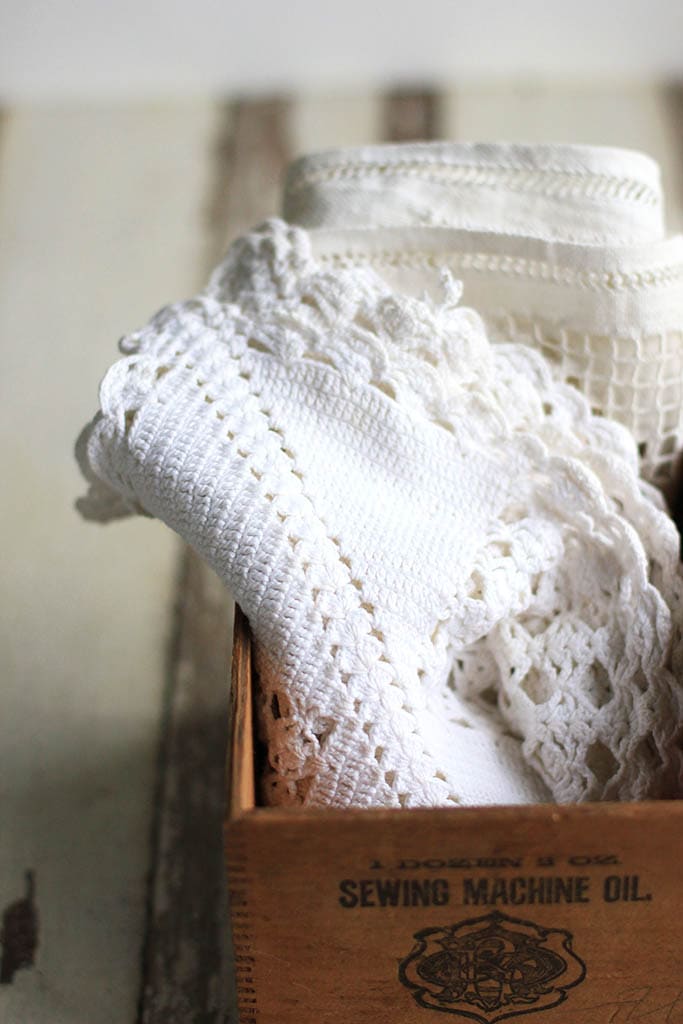



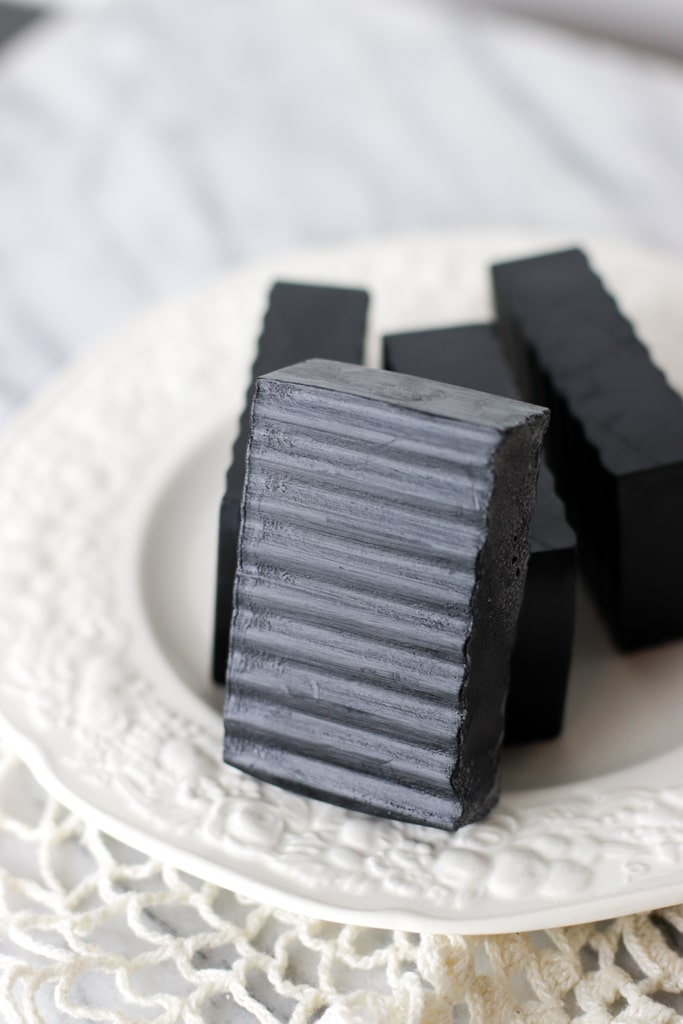
Wonderful video and thanks for all the information in Berkey!
I am still waiting to hear when the big Berkey is in